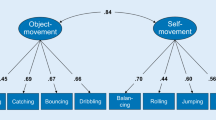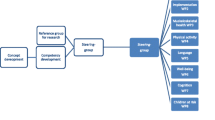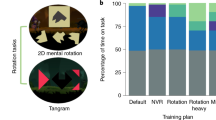Abstract
Research has shown that mental rotation (MR) can be improved through training. However, studies with preschool children are very scarce, due in part to the lack of consensus as to the age at which this ability arises and can be trained, and due to the difficulties of working on the understanding of this ability when it begins to develop. The present study was designed to observe the effect of an MR training on 1st (3–4-year-old children) and 3rd year (5–6-year-old children) of Early Childhood Education (preschool), as well as the development of this ability between both courses. Finally, this study aimed to analyze the differential increase of the training effect in relation to the initial MR ability of the participants. The results showed a significant improvement in the participants who underwent training in 3rd year of preschool, with the trained group showing a marginal improvement in 1st year of preschool. The older group showed lower error rates in training performance than the younger group, the latter having a linear decrease in performance as the angular disparity increased. In addition, in relation to training, a greater increase of MR was observed in the 3rd year preschoolers with lower scores in the pretest. These results suggest that MR is in full development and that it is a spatial ability that can be trained at preschool ages. In addition, the possibility of enhancing this ability to a greater extent in preschoolers who exhibit lower initial MR level is especially relevant.


Similar content being viewed by others
References
Abad, F. J., Olea, J., Ponsoda, V., & García, C. (2011). Medición en ciencias sociales y de la salud “Measurement in social and health sciences”. Madrid: Síntesis.
Baenninger, M., & Newcombe, N. S. (1989). The role of experience in spatial test performance: A meta-analysis. Sex Roles, 20(5–6), 327–344. https://doi.org/10.1007/BF00287729.
Baniqued, P. L., Kranz, M. B., Voss, M. W., Lee, H., Cosman, J. D., Severson, J., & Kramer, A. F. (2014). Cognitive training with casual video games: Points to consider. Frontiers in Psychology. https://doi.org/10.3389/fpsyg.2013.01010.
Cherney, I. D., Bersted, K., & Smetter, J. (2014). Training spatial skills in men and women. Perceptual & Motor Skills: Learning & Memory, 119(1), 82–99. https://doi.org/10.2466/23.25.PMS.119c12z0.
Cooper, L. A., & Shepard, R. D. (1973). Chronometric studies of the rotation of mental images. In W. Chase (Ed.), Visual Information Processing. New York: Academic Press.
David, L. T. (2012). Training effects on mental rotation, spatial orientation and spatial visualisation depending on the initial level of spatial abilities. Procedia Social and Behavioral Sciences, 33, 328–332. https://doi.org/10.1016/j.sbspro.2012.01.137.
Dean, A. L., & Harvey, W. O. (1979). An information-processing analysis of a Piagetian imagery task. Developmental Psychology, 15(4), 474–475.
Ehrlich, S. B., Levine, S. C., & Goldin-Meadow, S. (2006). The importance of gesture in children’s spatial reasoning. Developmental Psychology, 42(6), 1259–1268. https://doi.org/10.1037/0012-1649.42.6.1259.
Estes, D. (1998). Young children’s awareness of their mental activity. The case of mental rotation. Child Development, 69(5), 1345–1360. https://doi.org/10.2307/1132270.
Fernández-Méndez, L. M., Contreras, M. J., & Elosúa, M. R. (2018). From what age is mental rotation training effective? Differences in preschool age but not in sex. Frontiers in Psychology, 9, 753. https://doi.org/10.3389/fpsyg.2018.00753.
Frick, A., Daum, M. M., Walser, S., & Mast, F. W. (2009). Motor processes in children’s mental rotation. Journal of Cognition and Development, 10(1–2), 18–40. https://doi.org/10.1080/15248370902966719.
Frick, A., Ferrara, K., & Newcombe, N. S. (2013). Using a touch screen paradigm to assess the development of mental rotation between 3½ and 5½ years of age. Cognitive Processing, 14(2), 117–127. https://doi.org/10.1007/s10339-012-0534-0.
Frick, A., Hansen, A. A., & Newcombe, N. S. (2013). Development of mental rotation in 3- to 5-year-old children. Cognitive Development, 28(4), 386–399. https://doi.org/10.1016/j.cogdev.2013.06.002.
Frick, A., Möhring, W., & Newcombe, N. S. (2014). Picturing perspectives: Development of perspective-taking abilities in 4- to 8-year-olds. Frontiers in Psychology, 5, 386. https://doi.org/10.3389/fpsyg.2014.00386.
Funk, M., Brugger, P., & Wilkening, F. (2005). Motor processes in children’s imagery: The case of mental rotation of hands. Developmental Science, 8(5), 402–408. https://doi.org/10.1111/j.1467-7687.2005.00428.x.
García-Madruga, J. A., Elosúa, M. R., Gil, L., Gómez-Veiga, I., Vila, J. O., Orjales, I., et al. (2013). Reading comprehension and working memory’s executive processes: An intervention study in primary school students. Reading Research Quarterly, 48(2), 155–174. https://doi.org/10.1002/rrq.44.
Iverson, J. M. (2010). Developing language in a developing body: The relationship between motor development and language development. Journal of Child Language, 37(2), 229–261. https://doi.org/10.1017/S0305000909990432.
Karbach, J., Stroback, T., & Schubert, T. (2015). Adaptive working-memory training benefits reading, but not mathematics in middle childhood. Child Neuropsychology, 21(3), 285–301. https://doi.org/10.1080/09297049.2014.899336.
Kosslyn, S. M., Margolis, J. A., Barrett, A. M., Goldknopf, E. J., & Daly, P. F. (1990). Age differences in imagery abilities. Child Development, 61(4), 995–1010. https://doi.org/10.1111/1467-8624.ep9102040959.
Krüger, M., Kaiser, M., Mahler, K., Bartels, W., & Krist, H. (2014). Analogue mental transformations in 3-year-olds: Introducing a new mental rotation paradigm suitable for young children. Infant and Child Development, 23(2), 123–138. https://doi.org/10.1002/icd.1815.
Levine, S. C., Ratliff, K. R., Huttenlocher, J., & Cannon, J. (2012). Early puzzle play: A predictor of preschoolers’ spatial transformation skill. Developmental Psychology, 48(2), 530–542. https://doi.org/10.1037/a0025913.
Liben, L. S., Kastens, K. A., & Stevenson, L. M. (2002). Real-world knowledge through real-world maps: A developmental guide for navigating the educational terrain. Developmental Review, 22(2), 267–322.
Linn, M. C., & Petersen, A. C. (1985). Emergence and characterization of sex differences in spatial ability: A meta-analysis. Child Development, 56(6), 1479–1498. https://doi.org/10.2307/1130467.
Marke, S. (2008). The picture-rotation test: A measure to assess mental-rotation ability at preschool age. Saarbrücken: VDM Verlag Dr. Mueller.
Marmor, G. S. (1975). Development of kinetic images: When does the child first represent movement in mental images? Cognitive Psychology, 7, 548–559.
Marmor, G. S. (1977). Mental rotation and number conservation: Are they related? Developmental Psychology, 13, 320–325.
Mix, K. S., & Cheng, Y.-L. (2012). Space and math: The development and educational implications. In J. Benson (Ed.), Advances in child development and behavior (pp. 179–243). New York: Elsevier.
Mix, K. S., Cheng, Y.-L., Hambrick, D. Z., Levine, S. C., Young, C., Ping, R., & Konstantopoulos, S. (2016). Separate but correlated: The latent structure of space and mathematics across development. Journal of Experimental Psychology: General, 145(9), 1206–1227. https://doi.org/10.1037/xge0000182.
Newcombe, N. S., & Frick, A. (2010). Early education for spatial intelligence: Why, what, and how. Mind, Brain, and Education, 4(3), 102–111. https://doi.org/10.1111/j.1751-228X.2010.01089.x.
Noda, M. (2010). Manipulative strategies prepare for mental rotation in young children. European Journal of Developmental Psychology, 7(6), 746–762. https://doi.org/10.1080/17405620903465771.
Piaget, J., & Inhelder, B. (1971). Mental imagery in the child: A study of the development of imaginal representation. New York: Basic.
Platt, J. E., & Cohen, S. (1981). Mental rotation task performance as a function of age and training. The Journal of Psychology, 108(2), 173–178.
Quaiser-Pöhl, C. (2003). The mental cutting test ‘Schnitte’ and the picture rotation test-two new measures to assess spatial ability. International Journal of Testing, 3(3), 219–231. https://doi.org/10.1207/S15327574IJT0303_2.
Shepard, R. N., & Cooper, L. A. (1982). Mental images and their transformations. Cambridge: MIT Press.
Terlecki, M. S., Newcombe, N. S., & Little, M. (2008). Durable and generalized effects of spatial experience on mental rotation: Gender differences in growth patterns. Applied Cognitive Psychology, 22(7), 996–1013. https://doi.org/10.1002/acp.1420.
Uttal, D. H. (2000). Seeing the big picture: Map use and the development of spatial cognition. Developmental Science, 3(3), 247–286.
Uttal, D. H., Meadow, N. G., Tipton, E., Hand, L. L., Alden, A. R., Warren, C., & Newcombe, N. S. (2013). The malleability of spatial skills: A meta-analysis of training studies. Psychological Bulletin, 139(2), 352–402. https://doi.org/10.1037/a0028446.
Wai, J., Lubinski, D., & Benbow, C. P. (2009). Spatial ability for STEM domains: Aligning over 50 years of cumulative psychological knowledge solidifies its importance. Journal of Educational Psychology, 101(4), 817–835. https://doi.org/10.1037/a0016127.
Acknowledgements
This research falls into the research line for which the authors have received financial support under the research project EDU2013-46437-R from the Spanish Ministry of Economy and Competitiveness. The authors wish to express their thanks to the “Instituto Veritas” School from Madrid for making available the sample of participants and the facilities of each school to carry out the tasks. The authors would also like to thank Dr. María Fernández Cahill for proofreading this manuscript.
Funding
This study was funded by Spanish Ministry of Economy and Competitiveness (EDU2013-46437-R).
Author information
Authors and Affiliations
Corresponding author
Ethics declarations
Conflict of interest
The authors declare that they have no conflict of interests.
Ethical approval
All procedures performed in studies involving human participants were in accordance with the ethical standards of the institutional and/or national research committee and with the 1964 Helsinki declaration and its later amendments or comparable ethical standards.
Informed consent
Informed consent was obtained from all individual participants included in the study.
Rights and permissions
About this article
Cite this article
Fernández-Méndez, L.M., Contreras, M.J. & Elosúa, M.R. Developmental differences between 1st and 3rd year of Early Childhood Education (preschool) in mental rotation and its training. Psychological Research 84, 1056–1064 (2020). https://doi.org/10.1007/s00426-018-1104-6
Received:
Accepted:
Published:
Issue Date:
DOI: https://doi.org/10.1007/s00426-018-1104-6




